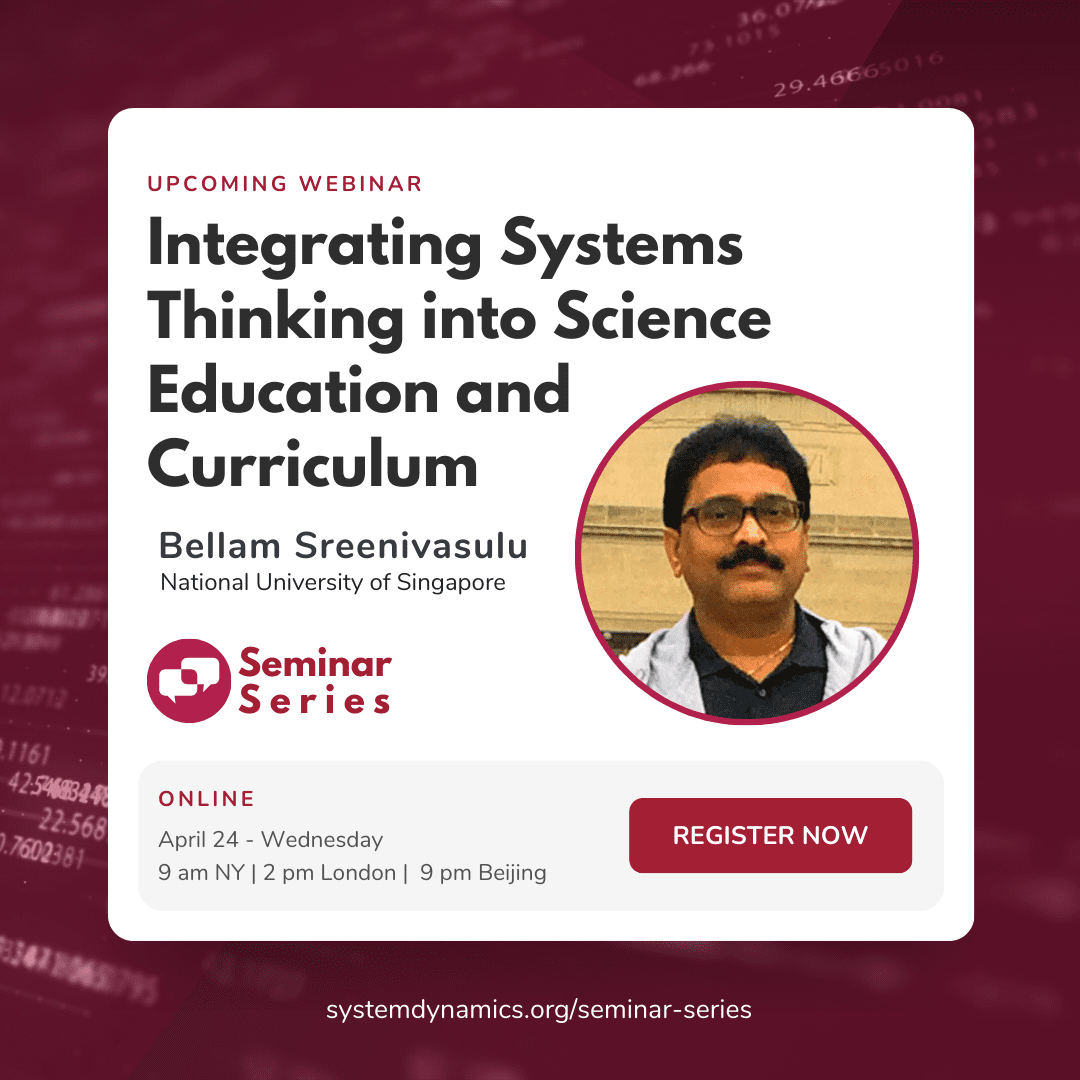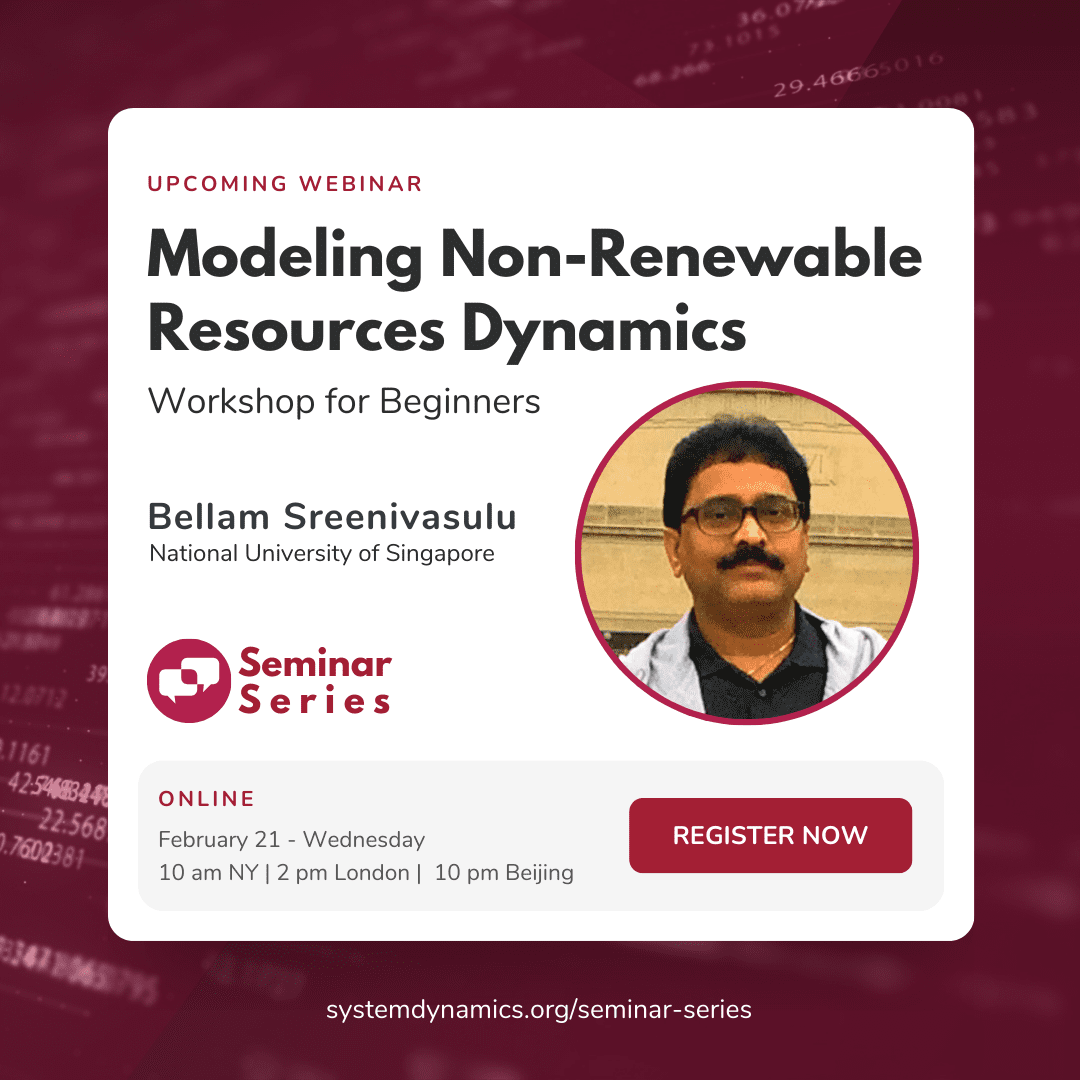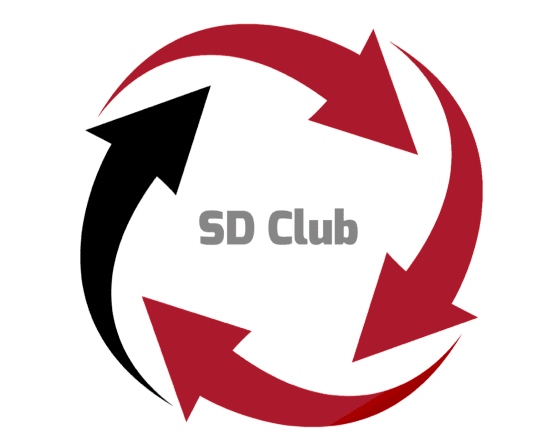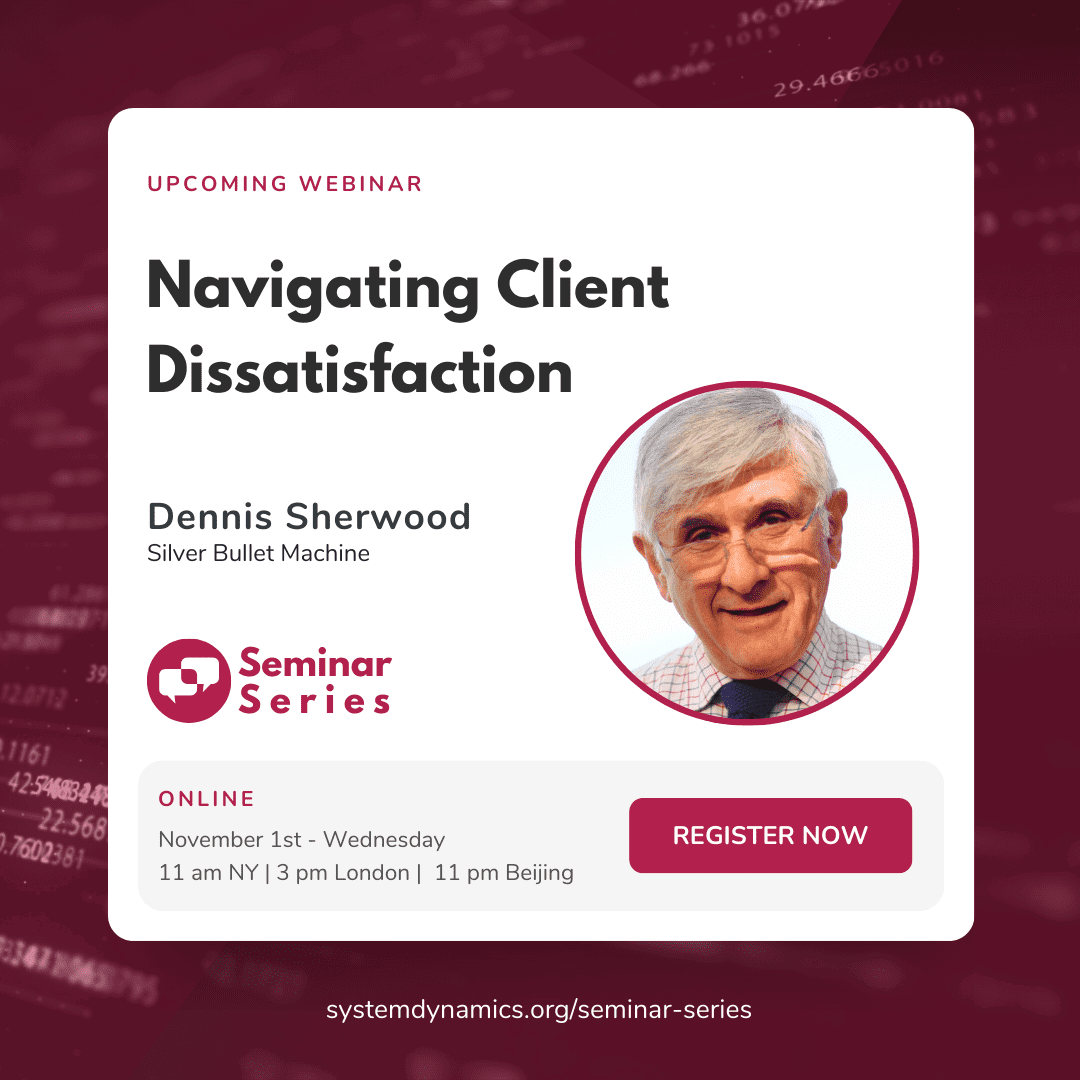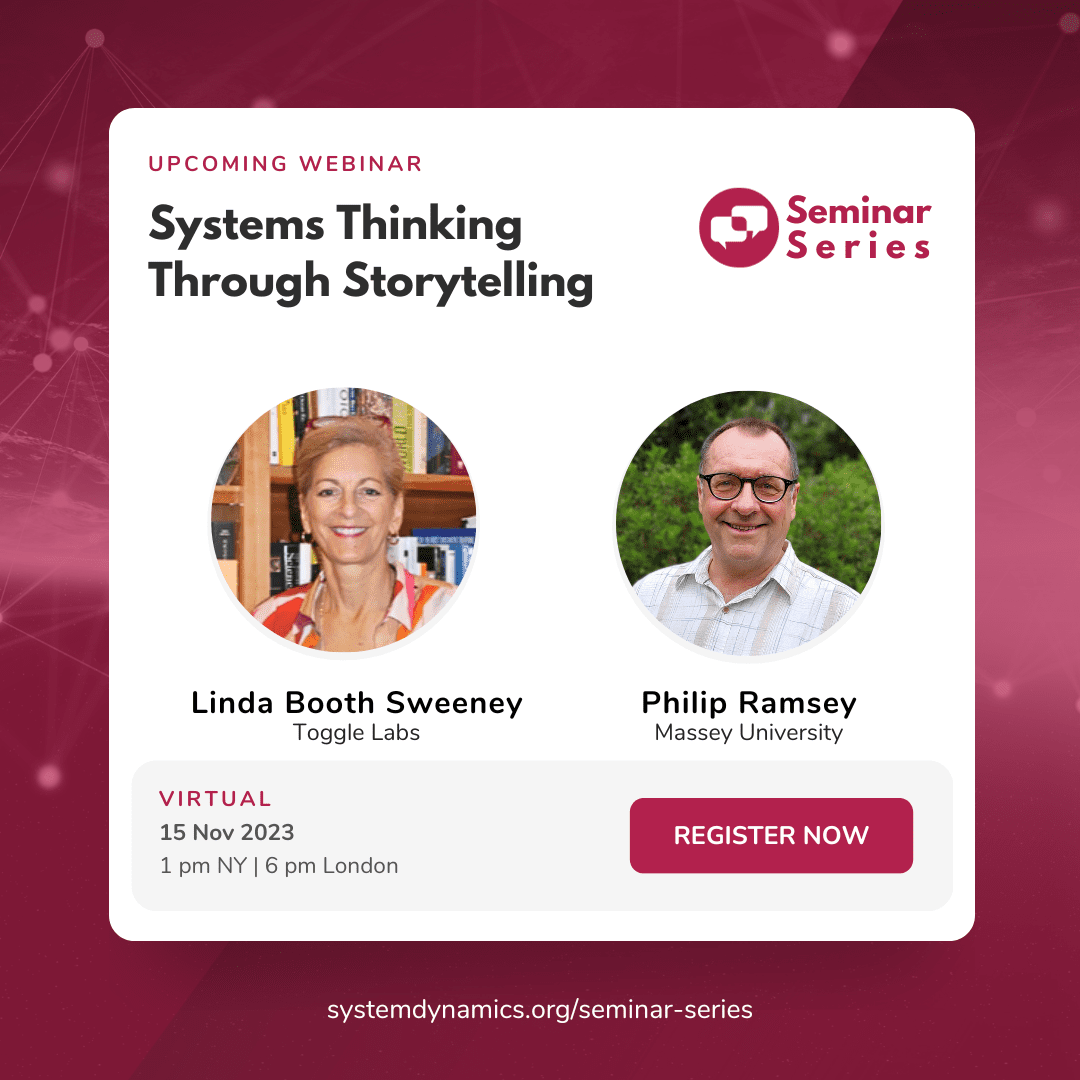Protected: 2024 Summer School Intermediate Course
A unique opportunity to learn (or review) the basics of System Dynamics and get exposed to real-world applications of the method
Restricted content
Integrating Systems Thinking into Science Education and Curriculum
April 24, 2024 at 9 am NY | 2 pm London | 9 pm Beijing | Time Converter
Integrating Systems Thinking into Science Education and Curriculum
For teaching and learning science through rich-contexts and complex real-world scenarios, application of systems thinking approaches offers convenient platform. This framework can be well integrated into problem-based learning, learning from case studies, project-based approaches etc. Compared to reductionist approach, systems approach will also facilitate students’ holistic and interdisciplinary understanding about a complex problem. Along these lines, this seminar focuses to explore the scope of applying systems thinking concepts into science teaching and curriculum with a focus in the context of chemistry teaching and learning.
About the Presenter
Dr. Bellam Sreenivasulu, Senior Lecturer and Resident Fellow at the Residential College-4 (RC4), National University of Singapore (NUS), holds a Ph.D. in Chemistry and a postdoctoral fellowship from the Institute of Chemical and Engineering Sciences (ASTAR, ICES). He has extensive teaching experience in chemistry and applied chemistry such as supramolecular chemistry. Currently, at RC4, Dr. Bellam specializes in systems thinking and system dynamics (ST&SD) curriculum with a focus on modeling real-world complex problems in relation to energy systems- sustainable energy, renewable energy, carbon emissions etc. He also teaches topics such as ‘Sleep Health for Holistic Wellbeing’ applying systems thinking approach. His educational research interests include chemistry education, ST&SD education exploring students’ learning and misconceptions in these areas.
Hands-On Workshop: Modeling Non-Renewable Resources Dynamics
Feb 21, 2024 at 9 am NY | 2 pm London | 10 pm Beijing | Time Converter
Hands-On Workshop: System Dynamics Modeling Non-Renewable Resources Dynamics
This session about modeling the depletion of non-renewable resources is intended to enable participants to understand the problem holistically through systems approach. First, they will learn to construct causal loop diagrams (feedback loops) by applying systems thinking concepts, and then learn to develop stock and flow diagrams as models for simulations to study how a system structure generates the behavior of overshoot and collapse of non-renewable resources. At the end of this session, the participants will be enabled to:
- Identify the cause and effect interactions among the key variables in the given system scenario to develop feedback loops
- Build stock and flow diagram to quantify the model on Vensim
- Run the simulations on Vensim to observe predicted dynamic behavior
- Propose policies for sustainable use of resources
This hands-on practice session is intended to engage beginners in the field of systems thinking and System Dynamics. It is expected to run for 2 hours.
Download the Software
This workshop will make use of Vensim PLE, the free version of the modeling software provided by Ventana Systems. To ensure efficient use of time during the workshop, we kindly ask all participants to download the software in advance from https://vensim.com/free-downloads/
Pre-Work Tasks
Before attending the workshop, please complete the PRE-WORK TASKS to ensure a productive learning experience:
- Watch the introductory segment (up to 10 minutes) of the video on ‘drawing causal loop diagrams (CLDs) in Vensim’ to familiarize yourself with the basics of CLD creation in Vensim. Access the video here: Vensim Causal Loop Diagramming Video.
- Practice drawing CLDs by replicating the example shown in the video. Once comfortable, save your version of the CLD in the ‘.mdl’ format with your name as the filename.
- Learn about constructing simple Stock and Flow Models in Vensim by watching the relevant video. This will provide foundational knowledge in creating stock and flow diagrams (SFD). Access the video here: Building a Simple Vensim Model.
About the Instructor
Dr. Bellam Sreenivasulu, Senior Lecturer and Resident Fellow at the Residential College-4 (RC4), National University of Singapore (NUS), holds a Ph.D. in Chemistry and a postdoctoral fellowship from the Institute of Chemical and Engineering Sciences (ASTAR, ICES). He has extensive teaching experience in chemistry and applied chemistry such as supramolecular chemistry. Currently, at RC4, Dr. Bellam specializes in systems thinking and system dynamics (ST&SD) curriculum with a focus on modeling real-world complex problems in relation to energy systems- sustainable energy, renewable energy, carbon emissions etc. He also teaches topics such as ‘Sleep Health for Holistic Wellbeing’ applying systems thinking approach. His educational research interests include chemistry education, ST&SD education exploring students’ learning and misconceptions in these areas.
MIT System Dynamics Seminar | Document the Model! What about the Modeling Process?
Please visit the MIT System Dynamics Seminars page for more information.
You are invited to attend the System Dynamics Seminar being held on Friday, December 8th from 12:30-2:00pm EST in the Jay W. Forrester conference room, E62-450, or via Zoom: https://mit.zoom.us/j/98105285349 (Password: SDFA23). Our guest speaker will be Warren Farr (Informed Dynamic Solutions) presenting Document the Model! What about the Modeling Process? (see abstract and brief bio below, announcement and paper attached). Lunch will be provided to those attending in person and a reminder email will be sent out closer to the date.
If you would also like to schedule a 30-minute 1:1 meeting with him before or after the seminar, please fill out the following link by COB Friday, December 1st and I will confirm times and location with a calendar invite: https://rallly.co/invite/CM6MpCN2rGWb. Please notify me if you need to meet over Zoom instead
Abstract: Documenting the process of building a simulation model is different from documenting the simulation model itself. Good model-building practice includes the discovery of potentially large sets of multimedia data. Organizing and documenting data and the process of collecting it has several advantages including: tightly linking data to its source and the timing of its discovery; separating source data from researcher inference (allowing for independent inspection); maintaining an evolutionary timeline; and easily sharing source data among participants and researchers. The topic of documenting models has been widely discussed. In contrast, this article proposes a data structure and its methods for documenting the process of building a simulation model.
This talk will focus on the motivations for building DynamicVu, an online software for documenting the modeling process using the data structure proposed in the SDR paper. Participants will be asked to reflect on the pros and cons of documenting the modeling process leading to an interactive discussion about best practices for documenting the model and the modeling process. How can such practices be supported in future software tools?
Brief Bio: Warren Farr holds an MS in System Dynamics from Worcester Polytechnic Institute and an MBA degree from Duke University. Warren is a seasoned business leader with over 35 years of experience. With a technical background, he focuses on how business opportunities change over time and the profitable use of technology. He has been using System Dynamics for the past 15 years to create succinct and engaging strategies that are successfully implemented. Warren is currently vice-chairman of Refrigeration Sales Corporation, a US regional distributor of heating, ventilating, air conditioning, and refrigeration equipment, parts, and supplies. He is also the president of Informed Dynamic Systems, where he creates database solutions and system dynamic simulation models and coaches others in the use of system dynamics. Warren has served on the Policy Council of the System Dynamics Society and is currently a member of its Stewardship Committee.
WPI System Dynamics Peer Tutoring Session
Please join WPI System Dynamics online Friday, Dec 1st 11AM ET (Boston time. Here is a time converter) for our last meeting of the fall 2023 semester. Hope you have a wonderful winter break! Or super summer depending on where you live!
In this Collective Learning Meeting (CLM), WPI System Dynamics will host a
Peer Tutoring Session
Peer Tutoring Sessions are open sessions where attendees network and discuss systems and simulation.
Please come to this CLM if you have questions about:
- Modeling and Analysis
- Research/Writing/Publishing
- Etc.
Or if you want to help others who may have questions.
We will not record this session but will take notes and share them. You can view the frequently asked questions (FAQ) from these sessions and more on our website.
Call-in details: TBA (See button below for the Zoom)
MIT System Dynamics Seminar | The Shallowness of Deep Division
Please visit the MIT System Dynamics Seminars page for more information.
You are invited to attend the System Dynamics Seminar being held on Friday, November 17th from 12:30-2:00pm EST in the Jay W. Forrester conference room, E62-450, or via Zoom: https://mit.zoom.us/j/98105285349 (Password: SDFA23). Our guest speaker will be Michael Macy (Cornell University) presenting The Shallowness of Deep Division (see abstract and brief bio below, announcement attached). Lunch will be provided to those attending in person and a reminder email will be sent out closer to the date.
If you would also like to schedule a 30-minute 1:1 meeting with him before or after the seminar, please fill out the following Doodle poll by COB Monday, November 13th and I will confirm times and location with a calendar invite: https://doodle.com/meeting/participate/id/bkoKOM6b. Please notify me if you need to meet over Zoom instead.
Abstract
Computational models reveal a tipping point in political polarization beyond which there is a potentially irreversible phase transition with two properties: 1) opinions become aligned across seemingly disparate political and cultural dimensions, and 2) existential threats to shared interests (like a lethal pandemic, catastrophic global warming, or aggression by a foreign adversary) have a divisive rather than unifying effect. This unraveling of the social fabric suggests partisan divisions that are deeply rooted in opposing ideologies. However, an online experiment suggests it may be the other way around. What appear to be irreconcilable differences in an increasingly polarized society may have arisen through a tipping dynamic that might just as easily have tipped the other way but for the luck of the draw among early movers. If so, the depth of the social fissure points to the shallowness of disagreements between tribal combatants whose vitriolic hostility is substantively unwarranted.
About the Presenter
Michael Macy is Distinguished Professor of Arts and Sciences at Cornell and Director of the Social Dynamics Lab. With support from the U.S. National Science Foundation, Google, Yahoo! Research, DARPA, IARPA, and the Korean National Research Foundation, his research team has used computational models, online laboratory experiments, and digital traces of device-mediated interaction to explore familiar but enigmatic social patterns, including network “wormholes,” circadian rhythms on Twitter and Spotify, racial discrimination on Airbnb, lifestyle politics, the polarization of science, network mobility, and partisan unpredictability. His research has been published in Science, PNAS, Science Advances, Nature Human Behaviour, American Journal of Sociology, American Sociological Review, and Annual Review of Sociology.
MIT System Dynamics Seminar | If Vensim is the Answer, What is the Question?
Please visit the MIT System Dynamics Seminars page for more information.
You are invited to attend the System Dynamics Seminar being held on Friday, October 20th from 12:30-2:00pm EST in the Jay W. Forrester conference room, E62-450, or via Zoom: https://mit.zoom.us/j/98105285349 (Password: SDFA23). Our guest speakers will be Tom Fiddaman (Ventana Systems) and Angie Moon (MIT Civil & Environmental Engineering) presenting If Vensim is the answer, what is the question? Reflecting on the future direction of the System Dynamics tool and user ecosystem (see abstract below, announcement attached). Lunch will be provided to those attending in person and a reminder email will be sent out closer to the date.
If you would also like to schedule a 30-minute 1:1 meeting with Tom before or after the seminar, please fill out the following Doodle poll by COB Tuesday, October 17th and I will confirm times and location with a calendar invite: https://doodle.com/meeting/participate/id/e09LyWya.
Abstract
Once upon a time, data was scarce, simulation was nearly unheard of, there were few ways to build and use quality dynamic models, and models rarely gave direct input to decisions. This made it easy for tool builders and tool users to coevolve within their own disciplinary stovepipes. The scale of our problems, and hopefully our opportunities, means that isolation is no longer viable. System Dynamics modelers can increasingly benefit from new tools in data science, AI and machine learning, and many fields could benefit from SD knowledge guiding better dynamics, realistic behavior, and useful interaction with decision makers.
Our future could be bright, with AI assistants freeing modelers from boring tasks, raising the productivity of thinking about systems, and making model results accessible to users. Or, it could be dark, with “ChatMDL” rapidly generating the simulation equivalent of 3-legged chicken images, models with superficial validity but more propaganda value than predictive accuracy, faster than we can debunk them.
In this seminar, I’d like to explore the state of the System Dynamics tool portfolio and the requirements of modelers and model consumers. In passing, I will mention the near-term roadmap for Vensim, as well as the broader ecosystem of SD tools many of us use. But the real goal is to discuss the long-term vision for System Dynamics. How do we realize a future in which:
- it’s easy to make every model a Bayesian blend of structure and parameter priors from subject matter expertise and data likelihoods?
- aggregation is not a dark art, but automated in a flexible and principled way?
- every model run is a synthetic data experiment supporting decision making under uncertainty?
- support for exploration of the state space yields as much understanding as we get from analytical methods on simple models?
- we have the computing power to support these innovations, and
- we can explain what we’re doing to influence people to solve our biggest problems.
Navigating Client Dissatisfaction
11 am NY | 3 pm London | 11 pm Beijing | Time Converter
Navigating Client Dissatisfaction
Every consultant has their share of success stories, but what happens when the client doesn’t like the analysis? Dive deep into the realities of professional consultancy where not every project ends with a fairy tale conclusion. In this session, Dennis Sherwood will share his personal journey of a decade-long engagement with a government client. Through this lens, he will shed light on the complexities and challenges faced when results don’t align with client expectations.
Join us to:
- Delve into the intricate dynamics of client relationships beyond conventional success narratives.
- Unpack strategies to manage, navigate, and turn around situations when clients are dissatisfied with the outcomes.
- Engage in an open forum to share your own experiences of when project outcomes diverged from client expectations.
About the Presenter
Dennis Sherwood has championed organizational innovation and creativity for over 20 years through his UK-based consultancy. A fervent advocate of systems thinking, Dennis’s vast experience ranges from being a consulting partner at Deloitte to holding pivotal roles at establishments like Goldman Sachs and SRI Consulting. An acclaimed author, Dennis has authored 15 books on topics spanning innovation, creativity, and systems thinking, with titles such as “Seeing the Forest for the Trees” and “How to Be Creative: A Practical Guide for the Mathematical Sciences.” Join us as Dennis unravels the nuances of client relationships, providing invaluable insights from his distinguished career.
Systems Thinking Through Storytelling
1 pm NY | 6 pm London | 2 am (Nov 16) Beijing | Time Converter
Systems Thinking Through Storytelling
Join us for a free seminar with Linda Booth Sweeney and Philip Ramsey, systems educators and authors whose books help teach about systems thinking through storytelling.
Linda will share “Curious about Connections,” a simple, inquiry-based teaching framework that fosters collaborative, inclusive dialogue while promoting systems thinking, critical thinking, communication skills, and empathy. She’ll demonstrate how to use this facilitation method using picture books as well as everyday scenarios. She is excited to share this facilitation method with our System Dynamics community and to explore ways families, teachers, and professionals can use it in a variety of settings.
Phil will share about his newly published Billibonk and Frankl book series, a collection of captivating jungle-based fables that showcase principles of systems thinking through the experiences of various animal characters. The stories are engaging and relatable to both children and adults, as they demonstrate how different species in the jungle learn to collaborate and solve problems together. The Billibonk and Frankl stories aim to help children see systems and interdependencies in the world around them.
About the Speakers
Linda Booth Sweeney is an educator, writer and strategist for healthy socio-ecological systems change, Dr. Linda Booth Sweeney is internationally recognized for her efforts to make systems thinking actionable by a wide range of audiences. In her Systems Leadership Labs, Linda creates experiences for leaders to think differently, and to experiment with language, visualization tools and knowledge architecture that better mirrors the complexity they are navigating. She is co-author of The Systems Thinking Playbook, The Climate Change Playbook, and numerous other books and journal articles. Her next book, Apart Together, is a gentle introduction to systems thinking for children and will be published by Balzer & Bray in October 2023. Linda holds her doctorate from Harvard’s Graduate School of Education and lives outside of Boston where she enjoys swimming in Walden Pond and amateur farming. For more information, see:
(systems), www.lindaboothsweeney.net
(children’s) www.lindaboothsweeney.com
(metaverse) https://togglelab.com
Phil is a Senior lecturer at Massey University in New Zealand, where he teaches Organizational Learning, Leadership, and Teamwork. He also works as a Director of Incite Learning, a consulting company that mainly works with schools, helping school leaders apply Organizational Learning concepts to solve tough problems.

